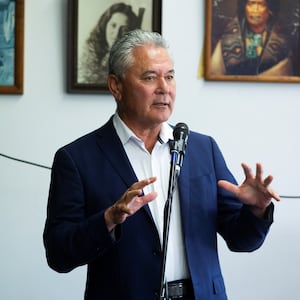Politics
Holocaust Centre Critiques John Tamihere’s ‘Nazi Germany’ Remark

The Holocaust Centre of New Zealand has sharply criticized Te Pāti Māori president John Tamihere for his recent assertion that the New Zealand Government is “worse than Nazi Germany.” This statement was made during an appearance on The Bradbury Group podcast hosted by media commentator Martyn Bradbury. The remark has sparked significant backlash, with the Centre describing it as “harmful at worst” and a radicalization of political discourse.
Tamihere’s comments surfaced while discussing the Labour Party’s prospects for re-election in 2026. He was joined by Labour MP Arena Williams, where they addressed issues surrounding immunization rates within Māori communities. Tamihere criticized the Government’s approach, characterizing it as a “bully-boy mentality” and claimed that alternative economic views expressed by academics were being undermined. He went on to state, “This is worse than Nazi Germany, this is a fascist regime that has to be removed.”
In response, Giacomo Lichtner, deputy chairman of the Holocaust Centre, condemned Tamihere’s hyperbolic rhetoric. Lichtner stated that such comparisons trivialize the historical significance of the Holocaust and contribute to an unproductive political atmosphere. He emphasized that while political discourse is vital, it should not resort to extreme analogies that distort reality.
The Holocaust Centre aims to educate the public about the atrocities of the Holocaust and to promote a message of tolerance and understanding. Lichtner reiterated that comparisons to historical events such as the Holocaust should be approached with utmost care and respect. He indicated that Tamihere’s comments could potentially alienate those who have a deep connection to the history of the Holocaust.
Political analysts have noted that remarks like Tamihere’s often serve to intensify division rather than foster meaningful dialogue. This incident has reignited discussions about the standards of political discourse in New Zealand and the responsibility of public figures to engage in respectful and fact-based conversations.
As the political landscape in New Zealand continues to evolve, the Holocaust Centre’s condemnation serves as a reminder of the importance of historical context in political discussions. The Centre calls for a more measured approach to political critique, one that acknowledges the past while addressing present challenges.
The ongoing debate highlights a broader trend in political rhetoric, where extreme comparisons frequently emerge. As New Zealand approaches its next elections, citizens and leaders alike are encouraged to reflect on the implications of their words and the legacy they leave behind.
-

 World2 weeks ago
World2 weeks agoPrivate Funeral Held for Dean Field and His Three Children
-

 Top Stories3 weeks ago
Top Stories3 weeks agoFuneral Planned for Field Siblings After Tragic House Fire
-

 Sports3 months ago
Sports3 months agoNetball New Zealand Stands Down Dame Noeline Taurua for Series
-

 Entertainment3 months ago
Entertainment3 months agoTributes Pour In for Lachlan Rofe, Reality Star, Dead at 47
-

 Entertainment2 months ago
Entertainment2 months agoNew ‘Maverick’ Chaser Joins Beat the Chasers Season Finale
-

 Sports3 months ago
Sports3 months agoSilver Ferns Legend Laura Langman Criticizes Team’s Attitude
-

 Sports1 month ago
Sports1 month agoEli Katoa Rushed to Hospital After Sideline Incident During Match
-

 Politics2 months ago
Politics2 months agoNetball NZ Calls for Respect Amid Dame Taurua’s Standoff
-

 World3 weeks ago
World3 weeks agoInvestigation Underway in Tragic Sanson House Fire Involving Family
-

 Top Stories3 weeks ago
Top Stories3 weeks agoShock and Grief Follow Tragic Family Deaths in New Zealand
-

 Entertainment3 months ago
Entertainment3 months agoKhloe Kardashian Embraces Innovative Stem Cell Therapy in Mexico
-

 World4 months ago
World4 months agoPolice Arrest Multiple Individuals During Funeral for Zain Taikato-Fox





















